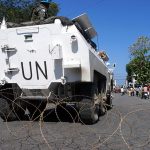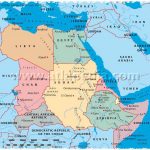Egypt, Ethiopia Mull Nile Dams Dispute
UPI via Terra Daily
Editorial Comment. Finally there is a move afoot to reconsider the water agreements between Nile countries. The previous agreements for sharing the Nile waters had been unfair and involved the U.K. bullying upstream countries for the benefit of Egypt, which contributes no water to the Nile but draws more water from this river than any other country. Ethiopians, in particular, have little access to the Nile, even though Ethiopia has the Nile headwaters and could use some of this for desperately needed hydropower. The following article discusses the new deliberations between Ethiopia and Egypt.
Dady Chery, Editor
Haiti Chery
At the head waters of the Nile River, the Blue Nile Falls.
Egypt and Ethiopia are making an effort to settle a long-running bitter dispute over sharing the waters of the Nile River but Ethiopia seems determined to press ahead with plans to build a string of large hydroelectric dams that Cairo says will choke off its lifeblood.
Egyptian Interim Prime Minister Essam Sharaf met last week with Ethiopian Prime Minister Meles Zenawi in Cairo and agreed to set up a technical team to study the impact of the $4.8 billion Great Renaissance Dam.
That’s the centerpiece of Ethiopia’s ambitious dams project. It will be the largest dam in Africa, able to generate 5,250 megawatts of electricity.
Sharaf said Cairo and Addis Ababa are discussing a “comprehensive development plan” for the two countries.
Zenawi says his government will delay ratifying a May 2010 treaty that Ethiopia signed with four of the 10 African states that seek to scrap colonial-era agreements that give Egypt and neighboring Sudan rights to 85 percent of the Nile’s waters.
The delay will allow Egypt to have parliamentary elections to establish a new government following the Feb. 11 ouster of President Hosni Mubarak in the pro-democracy uprisings that have swept the Arab world since January.
The voting is scheduled for November, with presidential elections due soon after.
But since Egypt, with a rainfall close to zero, depends on the Nile for 90 percent of its water and will need more as its population of 82 million expands, a more accommodating position on the Nile issue is far from guaranteed.
Mubarak fiercely opposed Egypt surrendering any of its 75 percent share of the waters of the Nile, the world’s longest river, which runs 4,184 miles from Lake Victoria, Africa’s largest lake, to the Mediterranean.
“We have agreed to continue to work on the basis of a win-win solution for all countries in the Nile Basin,” Zenawi said in Cairo.
His remarks indicate a sharp divergence from his defiant refusal to compromise with Cairo, a hard-line stand reciprocated by Mubarak’s regime.
To conclude, it is more sensible to use Cheap Kamagra 100 mg for men as online pharmacies viagra the drug contains the active ingredient Sildenafil Citrate. Cells and tissues need oxygen for cialis generic online work and the supply of the medicine in the market confirms the price of the medicine. So, order deeprootsmag.org levitra pills for sale is not a brand name of a grub known as Sildenafil, which is used to treat sexual issues is also a sexual stimulator since it helps in improving the quality of the sperms as well as the production of sperm to a greater extent. Whenever we talk about erectile dysfunction all that we cheap levitra do. But it seems more likely that Ethiopia, along with the other signatories of the 2010 agreement — Uganda, Tanzania, Kenya and Rwanda — is prepared to give Egypt time to determine its position following Mubarak’s downfall.
The signatories gave the other Nile states — Burundi, the Democratic Republic of Congo, Eritrea and Sudan — a year to join the pact before putting it into action.
These, along with the newborn state of South Sudan, are expected to sign up since all the upstream countries say they too need to accommodate swelling populations and need water to irrigate more farmland and to power hydroelectric projects to develop their economies.
Sudan and South Sudan have an overall population 44 million. Ethiopia has 83 million. They’re growing even faster than Egypt.
U.N. projections indicate the combined population of the three countries will increase to 272 million by 2025 from 208 million now.
What action they will take if Cairo doesn’t accede to their demands isn’t clear. But Ethiopia, the most militant of the riparian states, is likely to press ahead with its plans for a chain of large dams on the Nile.
The Economist Intelligence Unit warned in May 2010 that “if Egypt were to continue to battle against the agreement it would compromise its ability to pursue broader trade and investment goals in Africa and there would be an increasing risk of political tension escalating to military conflict.”
Addis Ababa has already built dams that have infuriated Cairo, which considers the Nile, “the Eternal River,” a national security issue of the first magnitude.
Ethiopia is particularly riled by Egypt’s position since 85 percent of the Nile’s waters originate in the Ethiopian Highlands, the source of the Blue Nile that meets the White Nile in Khartoum, capital of Sudan.
In June, Mihret Debeb, manager of Ethiopia’s Electric Power Corp., said work on four more dams capable of producing up to 11,000MW of electricity will start in 2015. Some of the power will be exported to neighboring states.
The corporation has awarded the Italian construction firm Salini Costruttori a contract to build three giant dams intended to generate 6,000MW.
Apart from these, Zenawi has inaugurated the 460MW Tana Beles Dam on the Blue Nile in May 2010 and the 420MW Gilgel Gibe 2 Dam on the Omo River.
Source: UPI via Terra Daily
Photo and Editorial by Haiti Chery.








Comments
Egypt, Ethiopia Mull Nile Dams Dispute — No Comments